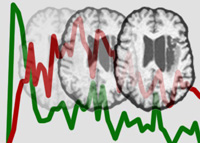
on brain region activation.
Working with focal lesion stroke survivors provides a unique opportunity to study the neural organization of cognitive subsystems. Over the years, the our research has focused on the effects of unilateral focal brain damage (left, right, anterior and posterior) on language processing:
- the use of context (both sentential and prosodic) at the level of lexical access and structural parsing the ability to use
- grammatical constraints in real time during the processing of long distant dependency relations {those involved in structurally defined gaps, pronouns and reflexives};
- the levels of analyses that are used during these automatic acts of co-referential processing; and
- the role of prosody in lexical and structural parsing, particularly with respect to the time course of the role of the right hemisphere in language processing.
The aphasia research has demonstrated a dissociation between a patient’s conscious behavioral performances and real time (unconscious) processing of sentential constructions. Anterior-lesioned left hemisphere damaged patients show relatively spared comprehension during “normal” conversation yet show a worse performance (as compared to age-matched controls) do in real-time sentence processing studies. Conversely, posterior-lesioned left hemisphere damaged patients demonstrate impaired comprehension performances during conscious tasks yet actually perform “normally” on on-line tasks. Not only have these findings allowed for the separation of left hemisphere regions that are seemingly involved in syntactic parsing systems, they have also allowed for the investigation of the intra-hemispheric roles of the right hemisphere at various temporal stages of language processing.
Work with anterior-lesioned patients has also allowed for the investigation of the temporal parameters involved in the “automatic” access of lexical or semantic information. Previous work has demonstrated the ability of this population to demonstrate this automatic access between lexical elements if given enough time to demonstrate the ability. This has been explained as a slow-rise time. Recently, the our work has also revealed that this slow-rise time may in fact percolate into the structural levels of auditory sentence processing. Recent work has demonstrated that while anterior-lesioned patients do indeed show aberrant canonical-recovery processes when parsing object-relative constructions, they can perform these linkings at a later, temporally distal point in a sentence.
